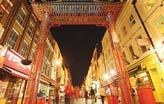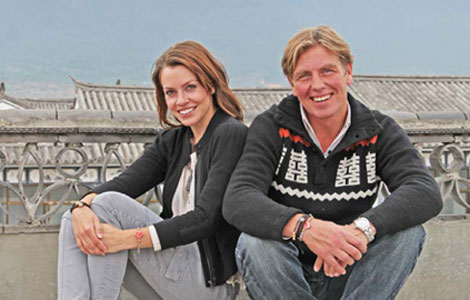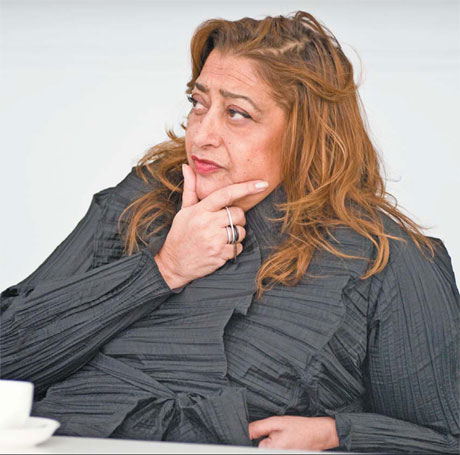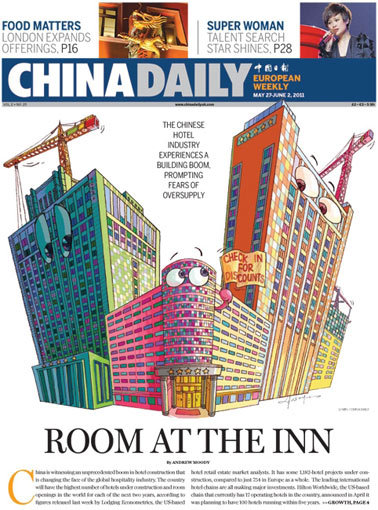From the ground up
Updated: 2011-05-13 11:47
By Andrew Moody (China Daily European Weekly)
|
|
Architect of Guangzhou Opera House has many projects under way, including 2012 Olympics
 |
As one of the most high-profile figures in her profession, she says she has had to fight against prejudice for most of her career, particularly in her adopted home of the United Kingdom.
"I can't say it is all ironed out. The irony is I don't confront it in the Arab world or in China or Japan. It is more in the Anglo-Saxon world. I don't know what it is like to be a man. I am sure life would have been a lot easier," she says.
"I think the English are scared of women. I don't know. I can't explain it. It is inexplicable."
Whether scary is the right word, Hadid cuts an imperious figure at the practice she has built up in a Victorian school building in Clerkenwell in London since the mid-1980s.
Her London-based firm recently completed the 150-million-euro Guangzhou Opera House, which took five years to build.
She remains the only woman ever to have won the Pritzker Architecture Prize, the equivalent of the Nobel Prize of architecture, and she was named last year by Time magazine as one of the world's most influential thinkers.
She has just returned from Paris where she launched her design of a traveling exhibition pavilion for Chanel and was putting her influential thinking down to her mobile phone not working.
"It is dead. It usually happens when I am away in the middle of a major thing and the stupid battery dies," she says.
Hadid, who speaks in a low gravelly voice and has an engagingly dry sense of humor, is, in fact, something of a technophobe and sketches her designs on paper rather than using a computer.
"It is a generational thing. The next generation design by computer. I can't. I would like to know how to do all this modeling on a computer. Maybe I could focus for a few weeks and do it," she says.
It is perhaps slightly ironic, therefore, that one of the most well-known images of Hadid - by Michael Craig Martin and which was on display at the National Portrait Gallery in London - is computer generated, giving her blond hair and purple lipstick.
The 60-year-old now has a big focus on China, where she first visited in the early 1980s.
She has a number of projects in the pipeline after recently completing the Guangzhou Opera House, which is typical of a Hadid design appearing as though it rises from the landscape.
She is working with SOHO China, the modernistic commercial and residential developer, on three new projects, two in Beijing and one in Shanghai.
Her firm's design for the new National Museum of China in Beijing has also made the shortlist.
"China is important not just because it is an enormous market but there is also a nice rapport there," she says. "They are very updated in their approach. They don't want you to do something you have done 10 or 15 years ago. They want something fresh and new, something that connects to the situation in the country now."
Hadid was born in Baghdad, the daughter of a prominent politician and wanted to be an architect from the age of 11.
"I don't know why exactly but architecture was very topical everywhere in the 1960s. You had Chicago being built, there was much going on in South America and in the Arab world architecture was about building national identity. Frank Lloyd Wright had just built the Baghdad Opera House," she says.
Partly educated at a boarding school in England, Hadid studied mathematics at the American University of Beirut. She then went to London to study architecture at the Architectural Association in London in the 1970s, which was a hot bed of radical ideas.
She moved on to teach there rather than enter a practice and sought to make her mark through entering competitions.
The breakthrough came when she won a major international competition to design the Peak Club, a futuristic sports and spa facility, in Hong Kong in 1983. The developer went bust, however, and it was never built. This was a problem that dogged her early career.
Her design for the Cardiff Bay Opera House in the mid-1990s managed to win two open competitions despite local opposition, but was eventually abandoned by politicians.
Unfairly or otherwise she gained a reputation for designing buildings that could not be built.
"You couldn't say that. They were not tested. I think it was some really idiotic journalist in Hong Kong who said the Peak was unbuildable. As for Cardiff, it went wrong from the first minute and they basically didn't want me," she says.
Hadid says when she first started her firm in the 1980s, largely with the financial boost of the 100,000-pound (114,000 euros) prize for the Hong Kong Peak competition, it was something of a stultifying atmosphere for architects.
"There was no respect for architects. They were seen as like plumbers, just another services provider. Some developers would even build without architects and as a result some of the architecture from that period is terrible," she says.
The opening-up of markets such as Asia, China in particular, has brought a breath of fresh air to the industry, according to Hadid.
"Countries like China have led to standards going up. They realize you can do something really quite exciting and interesting," she says.
"In the West, things are more frozen because there is an obsession with historical context. This sense you can't build anything new and it is nonsense. How would history have progressed if every generation couldn't have put on a new layer. The Romans themselves were not frozen in time."
Hadid has not been back to her native Iraq for 30 years but has recently been commissioned to design a new headquarters for the central bank in Baghdad.
"I was born there so I still feel very close to it, but the difficult thing is I don't know anyone there. My parents are not living and all my relatives are not there. So if I go back it would be quite an emotional return," she says.
"I hear the news. I think it is slightly settling down and improving, but it is still a very tough situation."
Hadid is involved in a number of high-profile projects, including the aquatics centre for the London 2012 Olympic Games. She says the design is different than the Water Cube in Beijing, which was designed by an international consortium of architects.
"I went to see it when I was in China. It is very beautiful actually. It is only blue because it catches the light but it is better and more modest in real life," she says.
Hadid's work is often seen as artistic, renowned for fluid designs that blur the distinction between the external and internal part of a building.
"I am not an artist. I would have been more successful if I had been an artist," she says throwing back her mane of hair and laughing.
Hadid contrasts Beijing Capital International Airport's new Terminal 3 with the shabbiness of Heathrow and believes there is much more ambition now in the East.
"China gives you an optimism about what can be achieved in a short space of time. The new buildings are much better, the landscaping is better; what I think is exciting is that you see change so fast," she says.
E-paper

Tapping into the future
Foreign companies are investing in China's water industry as many predict a growing profit margin.
Headhunters ride on growth
Commercial property rides wave
Learning from the past
Specials

Cuisine central
London's Chinatown is helping diners appreciate full palate of Chinese food

Tying the knot
Danish couple's high-end macrame export business takes off in the mountains of Yunnan.

Truly a super woman
Li Yuchun first came to prominence in 2005 as the Super Girl winner, and since then has become an international star.

